《现代大学英语听力2》听力原文及题目答案Unit5
大学英语二级视听说Unit5答案+原文
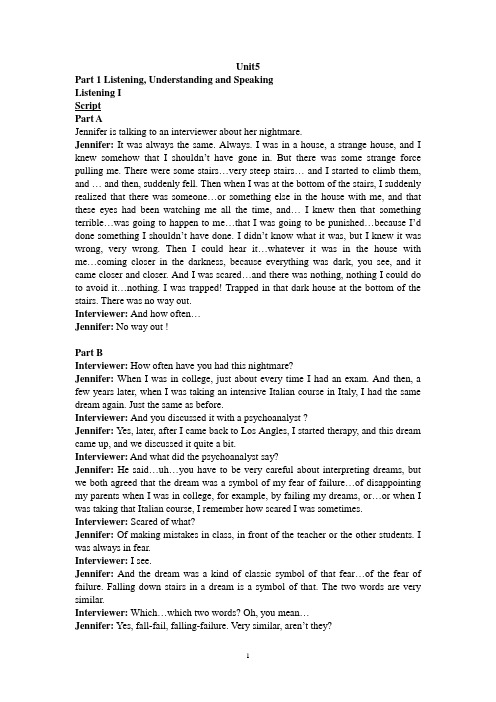
Unit5
Part 1 Listening, Understanding and Speaking
Listening I
Script
Part A
Jennifer is talking to an interviewer about her nightmare.
Jennifer: It was always the same. Always. I was in a house, a strange house, and I knew somehow that I shouldn‘t have gone in. But there was some strange force pulling me. There were some stairs…very steep stairs… and I started to climb them, and … and then, suddenly fell. Then when I was at the bottom of the stairs, I suddenly realized that there was someone…or something else in the house with me, and that these eyes had been watching me all the time, and…I knew then that something terrible…was going to happen to me…that I was going to be punished…because I‘d done something I shouldn‘t have done. I didn‘t know what it was, but I knew it was wrong, very wrong. Then I could hear it…whatever it was in the house with me…coming closer in the darkness, because everything was dark, you see, and it came closer and closer. And I was scared…and there was nothing, nothing I could do to avoid it…nothing. I was trapped! Trapped in that dark house at the bottom of the stairs. There was no way out.
全新版大学英第二版语综合教程2听力原文Unit 5
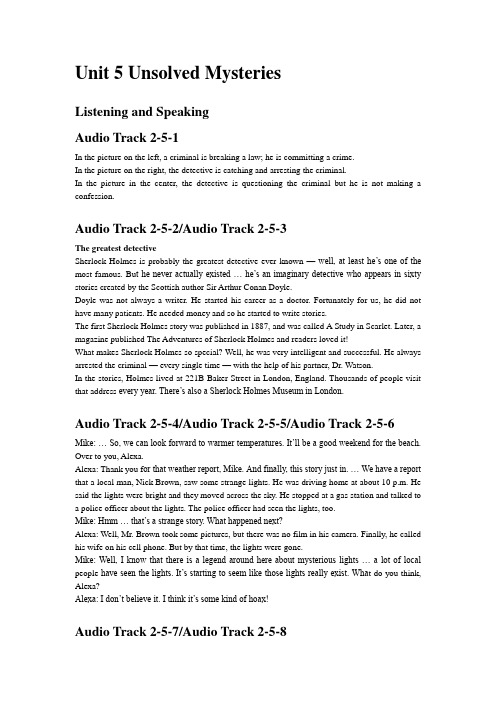
Unit 5 Unsolved Mysteries
Listening and Speaking
Audio Track 2-5-1
In the picture on the left, a criminal is breaking a law; he is committing a crime.
In the picture on the right, the detective is catching and arresting the criminal.
In the picture in the center, the detective is questioning the criminal but he is not making a confession.
Audio Track 2-5-2/Audio Track 2-5-3
The greatest detective
Sherlock Holmes is probably the greatest detective ever known —well, at least he’s one of the most famous. Bu t he never actually existed … he’s an imaginary detective who appears in sixty stories created by the Scottish author Sir Arthur Conan Doyle.
Doyle was not always a writer. He started his career as a doctor. Fortunately for us, he did not have many patients. He needed money and so he started to write stories.
全新版大学英语听说教程2unit5原文
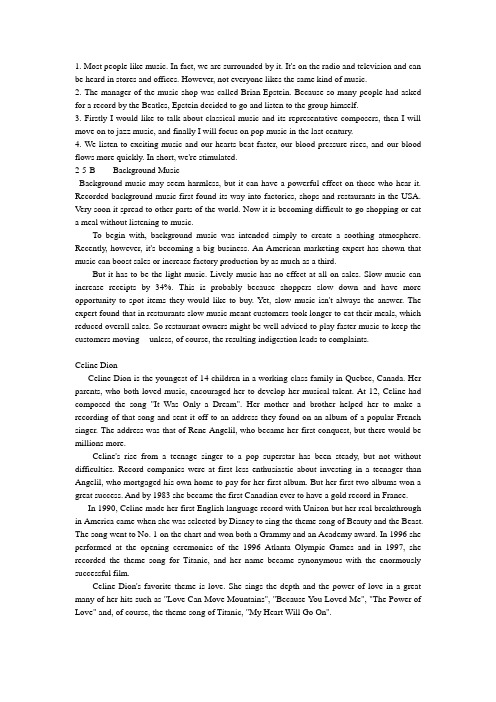
1. Most people like music. In fact, we are surrounded by it. It's on the radio and television and can be heard in stores and offices. However, not everyone likes the same kind of music.
2. The manager of the music shop was called Brian Epstein. Because so many people had asked for a record by the Beatles, Epstein decided to go and listen to the group himself.
3. Firstly I would like to talk about classical music and its representative composers, then I will move on to jazz music, and finally I will focus on pop music in the last century.
4. We listen to exciting music and our hearts beat faster, our blood pressure rises, and our blood flows more quickly. In short, we're stimulated.
现代大学英语听力2 Unit 5 Education
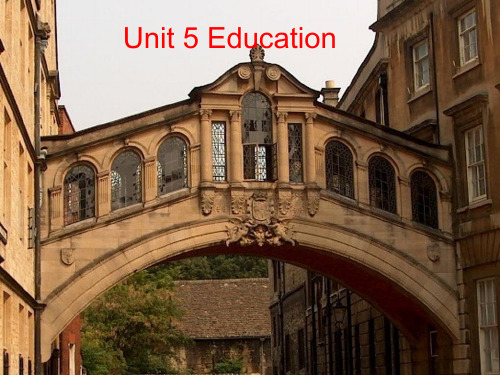
Objectives
1. Listen to the materials, learn the words, phrases and sentence patterns often used in conversations and discussions about education. 2. Understand and follow information on numbers. 3. Understand different steps in education and the aims of them. 4. Learn about and try to compare the education systems in different countries.
Background stages of education
stages of education
Primary Education is the 1st stage of compulsory education. It is preceded by pre-school or nursery education and is followed by secondary education. (In America, elementary education, middle school) The major goals: basic literacy and numeracy; foundations in science, geography, history, math, and other social sciences. In England Foundation S. 1 (age 3 to 4) pre-school/childcare environment Foundation S. 2 (age 4 to 5) Infant/ Primary school Key S. 1 (5-7) Infant / Primary school Key S. 2 (8-11) Junior / Primary school Secondary Education Higher education
完整word版新标准大学英语视听说教程2听力原文 Unit 5newword文档良心出品

performance. Darling, you were to die for! Unit 5-Conversation 1
Mark: OK, OK, don't exaggerate. I wasn't that good!
Anyway, I've got some great news! Have you got your tickets for the play? Mark:
Janet Kate: What play? : Tell us!
Mark: We've started talking about next term's OUDS play. Mark: The play which OUDS are producing. You know, the
play I'm in at the Oxford Playhouse. Kate: What's it going to be?
Mark: Kate: Oh, that play! Well, er ... Hamlet, by William Shakespeare!
Janet: Great! And who's going to play Hamlet? Mark: What about you, Janet?
Kate: What's the play called? Don't tell me, let me guess! Janet:
MarkBeckett. Mark: Waiting for Godot, by Samuel You are : To be or not to be, that is the question! Janet: coming, aren't you? I don't believe it. You're going to play Hamlet?
新编大学英语2视听说Unit5答案+原文
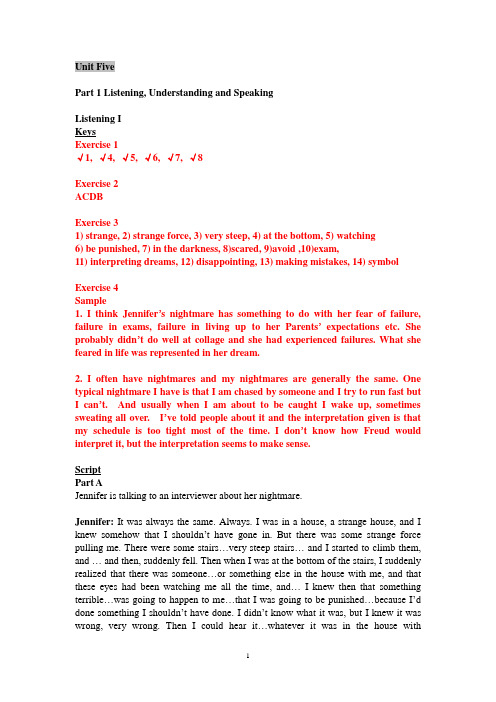
Unit Five
Part 1 Listening, Understanding and Speaking
Listening I
Keys
Exercise 1
√1, √4, √5, √6, √7, √8
Exercise 2
ACDB
Exercise 3
1) strange, 2) strange force, 3) very steep, 4) at the bottom, 5) watching
6) be punished, 7) in the darkness, 8)scared, 9)avoid ,10)exam,
11) interpreting dreams, 12) disappointing, 13) making mistakes, 14) symbol Exercise 4
Sample
1. I think Jennifer’s nightmare has something to do with her fear of failure, failure in exams, failure in living up to her Parents’expectations etc. She probably didn’t do well at collage and she had experienced failures. What she feared in life was represented in her dream.
2. I often have nightmares and my nightmares are generally the same. One typical nightmare I have is that I am chased by someone and I try to run fast but I can’t. And usually when I am about to be caught I wake up, sometimes sweating all over. I’ve told people about it and the interpretation given is that my schedule is too tight most of the time. I don’t know how Freud would interpret it, but the interpretation seems to make sense.
全新版大学英第二版语综合教程2听力原文Unit5
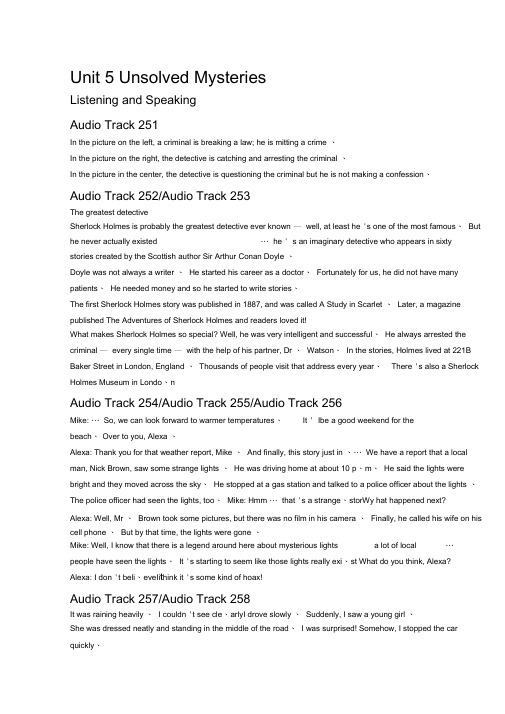
Unit 5 Unsolved Mysteries
Listening and Speaking
Audio Track 251
In the picture on the left, a criminal is breaking a law; he is mitting a crime 、
In the picture on the right, the detective is catching and arresting the criminal 、
In the picture in the center, the detective is questioning the criminal but he is not making a confession、
Audio Track 252/Audio Track 253
The greatest detective
Sherlock Holmes is probably the greatest detective ever known —well, at least he 's one of the most famous、But he never actually existed … he ' s an imaginary detective who appears in sixty stories created by the Scottish author Sir Arthur Conan Doyle 、
Doyle was not always a writer 、He started his career as a doctor、Fortunately for us, he did not have many patients、He needed money and so he started to write stories、
听力教程第二版第二册Unit-5答案

听力教程第二版第二册Unit-5答案
Unit5
Section One Tactics for Listening
Part2 listening and Note-taking
Reading
B: When should a child start learning to read and write? This is one of the questions I am most frequently asked. There is no hard and fast rule, for no two are alike, and it would be wrong to set a time when all should start being taught the ins and outs of reading letters to form words.
If a three-year-old wants to read (or even a two-year-old for that matter), the child deserves to be given every encouragement. The fact that he or she might later be "bored" when joining a class of non-readers at infant school is the teacher's affair. It is up to the teacher to see that such a child is given more advanced reading material.
《现代大学英语听力2》听力原文及题目答案unit5
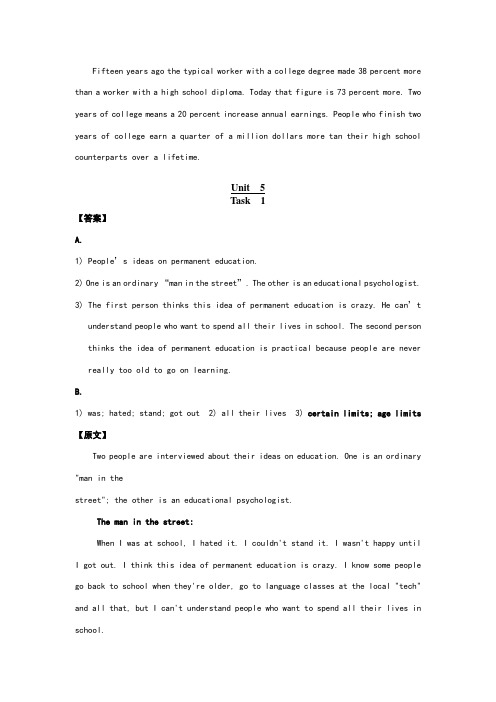
Fifteen years ago the typical worker with a college degree made 38 percent more than a worker with a high school diploma. Today that figure is 73 percent more. Two years of college means a 20 percent increase annual earnings. People who finish two years of college earn a quarter of a million dollars more tan their high school counterparts over a lifetime.
Unit 5
Task 1
【答案】
A.
1) People’s ideas on permanent education.
2) One is an ordinary “man in the street”. The other is an educational psychologist.
3) The first person thinks this idea of permanent education is crazy. He can’t
understand people who want to spend all their lives in school. The second person thinks the idea of permanent education is practical because people are never really too old to go on learning.
大学英语视听说2unit5听力原文
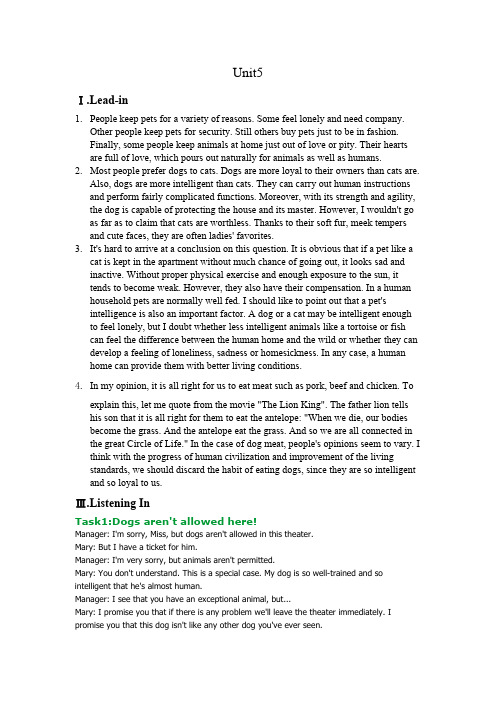
Unit5
Ⅰ.Lead-in
1.People keep pets for a variety of reasons. Some feel lonely and need company.
Other people keep pets for security. Still others buy pets just to be in fashion.
Finally, some people keep animals at home just out of love or pity. Their hearts are full of love, which pours out naturally for animals as well as humans.
2.Most people prefer dogs to cats. Dogs are more loyal to their owners than cats are.
Also, dogs are more intelligent than cats. They can carry out human instructions and perform fairly complicated functions. Moreover, with its strength and agility, the dog is capable of protecting the house and its master. However, I wouldn't go as far as to claim that cats are worthless. Thanks to their soft fur, meek tempers and cute faces, they are often ladies' favorites.
全新版大学英第二版语综合教程2听力原文Unit 5

Unit 5 Unsolved Mysteries
Listening and Speaking
Audio Track 2-5-1
In the picture on the left, a criminal is breaking a law; he is committing a crime.
In the picture on the right, the detective is catching and arresting the criminal.
In the picture in the center, the detective is questioning the criminal but he is not making a confession.
Audio Track 2-5-2/Audio Track 2-5-3
The greatest detective
Sherlock Holmes is probably the greatest detective ever known —well, at least he’s one of the most famous. Bu t he never actually existed … he’s an imaginary detective who appears in sixty stories created by the Scottish author Sir Arthur Conan Doyle.
Doyle was not always a writer. He started his career as a doctor. Fortunately for us, he did not have many patients. He needed money and so he started to write stories.
大学英语听说教程2答案unit5

大学英语听说教程2答案unit5
1、Mary _______ Math. [单选题] *
A. is good at(正确答案)
B. do well in
C. is good for
D. is good with
2、We got up early this morning and took a long walk after breakfast. We walked _____ the business section of the city. [单选题] *
A. among
B. between
C. through(正确答案)
D. upon
3、—______? —Half a kilo.()[单选题] *
A. How much are they
B. How much is it
C. How much would you like(正确答案)
D. How many would you like
4、13.—Will you come to my party?—I am not ________ . [单选题] *
A.mind
B.sure(正确答案)
C.happy
D.Sorry
5、The more he tried to please her, _____she seemed to appreciate it. [单选题] *
A.less
B.lesser
C.the less(正确答案)
D.the lesser
6、_________ we don't stop climate change, many animals and plants in the world will be gone. [单选题] *
现代大学英语听力2听力原文及题目答案Unit
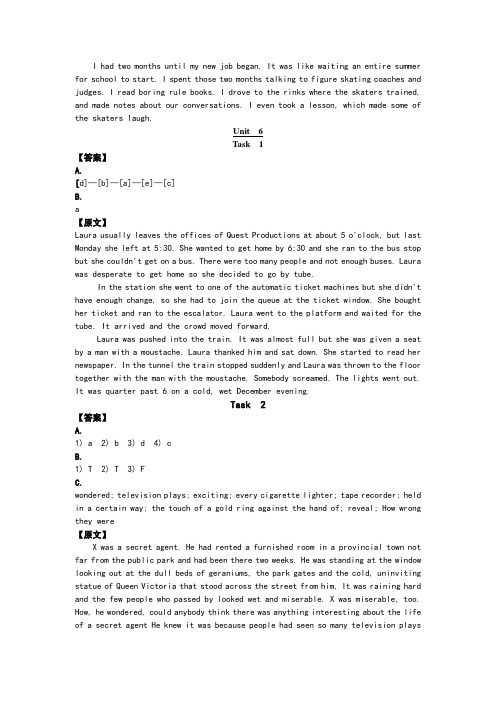
Harry: Not at all, Nora. It's wisest to decide in good time. Look at me, for example. I really wantedto be a sailor, but now I spend my days sitting at a desk in an office. Yes, it's silly to train forthe wrong job. And after all, Robert will be going to college soon.
【原文】
X wasa secret agent. He had rented a furnished room in a provincial town not far from the publicpark and had been there two weeks. He was standing at the window looking out at the dull beds ofgeraniums, the park gates and the cold, uninviting statue of QueenVictoriathat stood across the streetfrom him, It was raining hard and the few people who passed by looked wet and miserable. X wasmiserable, too. How, he wondered, could anybody think there was anything interesting about the lifeof a secret agent He knew it was because people had seen so many television playsabout glamorousspies that they thought the life of a secret agent was exciting. They were convinced that every cigarette lighter concealed a secret tape recorder; that a fountain pen held in a certain way would open alocked door, that the touch of a gold ring against the hand of an enemy would make him reveal all hissecrets. How wrong they were! He looked round his room. The wallpaper was in the worst possibletaste, the pictures horrible, the carpet worn, dirty and faded; and he was cold. This was the thirdMonday he had come to the window to look out. He prayed it would be the last.
大学英语二级视听说Unit5答案+原文

Unit5
Part 1 Listening, Understanding and Speaking
Listening I
Script
Part A
Jennifer is talking to an interviewer about her nightmare.
Jennifer: It was always the same. Always. I was in a house, a strange house, and I knew somehow that I shouldn‘t have gone in. But there was some strange force pulling me. There were some stairs…very steep stairs… and I started to climb them, and … and then, suddenly fell. Then when I was at the bottom of the stairs, I suddenly realized that there was someone…or something else in the house with me, and that these eyes had been watching me all the time, and…I knew then that something terrible…was going to happen to me…that I was going to be punished…because I‘d done something I shouldn‘t have done. I didn‘t know what it was, but I knew it was wrong, very wrong. Then I could hear it…whatever it was in the house with me…coming closer in the darkness, because everything was dark, you see, and it came closer and closer. And I was scared…and there was nothing, nothing I could do to avoid it…nothing. I was trapped! Trapped in that dark house at the bottom of the stairs. There was no way out.
现代大学英语听力2_dictation原文

Unit 1
Social customs and ways of behaving change. But they do not necessarily always change for the better. Things which were considered impolite many years ago are now acceptable. Just a few years ago, it was considered impolite behaviour for a man to smoke on the street. No man who thought of himself as being a gentleman would make a fool of himself by smoking when a lady was in the room.
The important thing to remember about social customs is not to do anything that might make other people feel uncomfortable — especially if they are your guests. There is a story about a rich nobleman who had a very formal dinner party. When the food was served, one of the guests started to eat his peas with a knife. Other guests were amused or shocked, but the nobleman calmly picked up his knife and began eating in the same way. It would have been bad manners to make his guest feel foolish or uncomfortable.
英语听力教程(第2册)Unit-5-听力原文

英语听力教程(第2册)Unit-5-听力原文
Unit 5 听力原文
Part I
B
Man: I suppose my career’s a bit unusual because I went to university when I was
twenty-five — a lot later than most people
go. When I left school, I went straight out
to work: I worked as a clerk in a small
office. My father criticized me, I
remember, for not going on studying while
I had the chance, but I wanted to earn
myself some money. Anyway, that job
didn’t last long because I had to go into
the army when I was twenty. I stayed in
for five years. I don’t know what good my
university course did because I’m
unemployed now. Oh, I know I got a job
when I finished my university course — I
was twenty-nine then — but it didn’t last
- 1、下载文档前请自行甄别文档内容的完整性,平台不提供额外的编辑、内容补充、找答案等附加服务。
- 2、"仅部分预览"的文档,不可在线预览部分如存在完整性等问题,可反馈申请退款(可完整预览的文档不适用该条件!)。
- 3、如文档侵犯您的权益,请联系客服反馈,我们会尽快为您处理(人工客服工作时间:9:00-18:30)。
Fifteen years ago the typical worker with a college degree made 38 percent more than a worker with a high school diploma. Today that figure is 73 percent more. Two years of college means a 20 percent increase annual earnings. People who finish two years of college earn a quarter of a million dollars more tan their high school counterparts over a lifetime.
Unit 5
Task 1
【答案】
A.
1) People’s ideas on permanent education.
2) One is an ordinary “man in the street”. The other is an educational psychologist.
3) The first person thinks this idea of permanent education is crazy. He can’t understand people
who want to spend all their lives in school. The second person thinks the idea of permanent education is practical because people are never really too old to go on learning.
B.
1) was; hated; stand; got out 2) all their lives 3) certain limits; age limits
【原文】
Two people are interviewed about their ideas on education. One is an ordinary "man in the street"; the other is an educational psychologist.
The man in the street:
When I was at school, I hated it. I couldn't stand it. I wasn't happy until I got out. I think this idea of permanent education is crazy. I know some people go back to school when they're older,
go to language classes at the local "tech" and all that, but I can't understand people who want to spend all their lives in school.
The educational psychologist:
The idea of permanent education is practical because we're never really too old to go on learning. Of course, there are certain limits, but they aren't age limits. For example, let's say a man past sixty tries to learn how to play football. It's foolish for him to do that, but only because his
body is too old, not his mind!
Task 2
【答案】
A.
Age Schooling
Four Nursery School
Five The Infants’ School
Seven The Junior School
B.
1) He stayed there for a year.
2) He has faint, but very pleasant memories of it. He had fun and played games---including story-telling, drawing, singing and dancing.
3) He began t have more formal lessons and even worry about exams.
4) The exam was called the “Eleven Plus”. Students took the exam to see what kind of secondary school they would get into.
【原文】
John is talking to Martin about his primary schooling.
Martin: Did you go to a state primary school?
John: Yes, I did. I went to a nursery school first, at the age of four, but this was purely voluntary.
There was a good kindergarten in our neighbourhood so my parents decided to send me
there for a year.
Martin: Can you still remember it?
John: Yes, I have faint, but very pleasant memories of it. It was a delightful place, full of fun and games. As in most nursery schools, work —if you can call it that —consisted of storytelling, drawing, singing and dancing.
Martin: You probably don't remember but you must have missed it when you left — you know, when you went to the Infants' School at the age of five.
John: I suppose I must have, but you know, right up to the age of seven, school life was very pleasant. It was only later in the Junior School that we began to have more formal lessons
and even worry about exams.
Martin: Really? Did you have to do exams at that age?
John: Yes, we used to then. We had to take an exam at the age of eleven called the "Eleven Plus"
to see what kind of Secondary school we would get into. But this exam has disappeared
nowadays.
Task 3
【答案】
A.
1) compulsory; the ages of 5 and 16; state-funded; independent
2) available; at a nursery school; in the nursery class at a primary school
3) preparatory; primary; aged 5 to 13
4) enter the state education system; at the age of 5; secondary school
5) 7, 11, 13 or 16; gain admission at 11 or 13; the Common Entrance Examination
6) one further year; Advanced Supplementary Examinations; Advanced Level Examinations
7) classroom; laboratory; work independently; undertake research for projects
8) vocational; conventional
9) secondary education; with A-levels; further; higher
B.
1) GCSE stand for the General Certificate of Secondary Education. It is normally take at the age
of sixteen.
2) Students usually study form 8 to 12 subjects over two years.
3) Some subjects take account of the work students do throughout the year, while others are assessed entirely by examination.
【原文】
Education in the United Kingdom is compulsory for everyone between the ages of five and sixteen, and is provided by two kinds of schools: state-funded schools and independent (fee-charging) schools.
Children education
Pre-school or pre-preparatory education: pre-school education is available in both the
